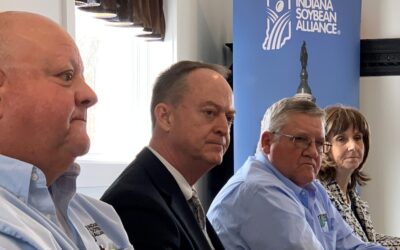Corn, soy policy groups encouraged with U.S. Supreme Court’s WOTUS ruling


INDIANAPOLIS, Ind. (May 30, 2023) — The Indiana Soybean Alliance’s Membership & Policy Committee (M&P) and the Indiana Corn Growers Association (ICGA), along with several other farm policy groups, were encouraged by the U.S. Supreme Court’s decision on Thursday that adds clarity to the Clean Water Act’s “Waters of the United States” (WOTUS) rule.
In the decision, the Supreme Court narrowed the jurisdiction of the U.S. Environmental Protection Agency (EPA) and the U.S. Army Corps of Engineers (Corps) by rejecting their “significant nexus test” for defining WOTUS in the Clean Water Act by a unanimous 9-0 vote. This “test” gave EPA and the Corps the authority to define WOTUS without a clear guideline to landowners – including farmers and ranchers. In a second ruling, by a 5-4 vote, the Court issued an opinion limiting the definition of adjacent wetlands.
“The Court’s decision is something we’ve been waiting for, and we are glad that it finally came down how we expected,” said ICGA President Scott Smith, a farmer from Windfall, Ind. “This is a great first step. The next step is working with EPA to develop a clear definition for WOTUS.”
The majority opinion, written by Justice Samuel Alito, said a wetland, or WOTUS, must have a continuous surface connection to a relatively permanent body of water that touches traditional, navigable water. The minority opinion, written by Justice Brett Kavanaugh, said a continuous surface connection test is too narrow, and overturns decades of precedent followed by both Republican and Democratic administrations.
The Court’s judgments were based on the Sackett v. EPA case in which a couple from Idaho challenged the EPA’s decision to prevent them from building a house due to its “significant nexus test” of WOTUS. This case dates to the EPA’s 2015 version of WOTUS. The WOTUS definition changed during the Trump Administration but has mostly reverted to the 2015 rule by the Biden Administration. EPA is expected to issue a revised WOTUS rule, since its current rule relies heavily on the significant nexus test.
The National Corn Growers Association (NCGA) and the American Soybean Association (ASA) filed a brief with the Supreme Court against the significant nexus authority claimed by EPA and the Corps.
“We really couldn’t have much influence on the Supreme Court’s decision, but we are happy that the Court agreed with our position,” said Greensburg, Ind., farmer Mike Koehne, a director for both ASA and M&P. “Now the real work begins. We will advocate for farmers and landowners for a WOTUS definition that we all can agree on. Farmers support the goals of the Clean Water Act. Farmers are the original stewards of the land. We work every day to take care of the land that takes care of us. We care deeply about the environment and clean water because this is where we live.”
For more than 50 years, the EPA and the Corps have wrestled with the problem of defining the term WOTUS and its jurisdictional reach over wetlands. Before this week, the Supreme Court has tried three times to clarify the meaning of WOTUS, adopting varying interpretations. This ruling tried again.
The Court said WOTUS in the Clean Water Act encompasses only relatively permanent, standing or continuously flowing bodies of water forming geographical features that are ordinarily described as streams, oceans, rivers and lakes. As for wetlands, the Court said the Clean Water Act extends only to wetlands that are indistinguishable from “waters of the United States.” The ruling requires EPA or the Corps to establish first that a body of water constitutes waters of the United States, and that a wetland has a continuous surface connection with that water – making it difficult to determine where water ends and a wetland begins.
To defend its position, EPA brought the 2023 WOTUS rule into the Court’s record. As a result, the 2023 rule remains on the books, but functionally EPA and the Corps cannot enforce it.
The Court said the EPA’s interpretation of WOTUS in the March 2023 rule is inconsistent with the text in the Clean Water Act. ICGA and M&P will urge EPA to replace the newest rule with one better aligned with the Court’s opinion.
[/et_pb_text][et_pb_divider _builder_version=”4.19.4″ _module_preset=”default” global_colors_info=”{}”][/et_pb_divider][et_pb_text admin_label=”Text” _builder_version=”4.21.0″ _module_preset=”default” hover_enabled=”0″ global_colors_info=”{}” sticky_enabled=”0″]
For all questions contact: Dave Blower Jr. at 317-644-0980; dblower@indianasoybean.com
About Indiana Soybean Alliance Membership and Policy Committee: The ISA Membership and Policy Committee works to enhance the viability of Indiana soybean farmers through the advocacy and promotion of state and federal policies. ISA Membership and Policy Committee is led by members of the Indiana Soybean Alliance farmer board who are charged with directing advocacy efforts on behalf of approximately 600 dues-paying members.
About Indiana Corn Growers Association: The Indiana Corn Growers Association works with state and federal governments to develop and promote sound policies that benefit Indiana corn farmers. The ICGA consists of nine farmer-directors who provide leadership to the organization on behalf of more than 700 members statewide.
This communication was NOT funded with Indiana corn checkoff dollars.
[/et_pb_text][/et_pb_column][/et_pb_row][/et_pb_section]
Posted: May 30, 2023
Category: ICGA, ICGA Press Releases, ISA, ISA Press Releases, Press Releases




